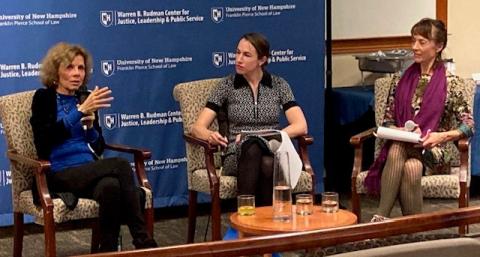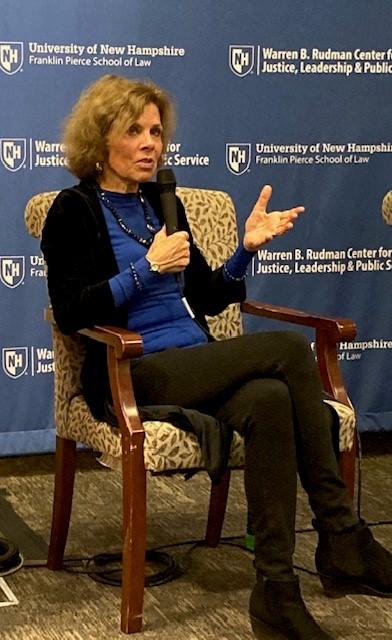First Amendment Scholar Nadine Strossen: ‘No matter how great the potential harm of the speech, the potential harm of censorship is even greater’
For anyone tempted to think these volatile times are exceptional, Nadine Strossen recommends some historical perspective.
“Each era tends to have what I call historical hubris,” said Strossen, a First Amendment scholar, Professor Emerita, and former ACLU president, during a recent discussion on the rights and responsibilities of free speech at UNH Franklin Pierce School of Law. The conversation was moderated by the Rudman Center’s executive director Anna Brown and community engagement director Laura Knoy and included a Q& A with students. (For the full discussion, visit here. Quotes in this piece have been edited slightly for clarity.)

Former ACLU president and Professor Emerita Nadine Strossen discusses free speech with Anna Brown, executive director of the Rudman Center, and Laura Knoy, community engagement director of the Rudman Center.
Speaking just days before the presidential election, Strossen addressed concerns about the virulent rhetoric that circulates with such speed and scope in the internet age.
“We are completely centered on ourselves and persuade ourselves that never before has anything like this ever happened in history,” she said.
Strossen called for “historical humility.”
“We have to understand that the basic underlying principles and contentions and debates and struggles have been experienced by many generations, by people of every religion, ethnicity, every other demographic characteristic, all over this world.”
Such struggles, she said, between a yearning for the freedom to express ourselves and fear of the negative power of words, are “eternal," Strossen said, and censors throughout history and to this day have had much to fear about the dangers of speech. Still, she said, “I think that the historical record should convince us that no matter how great the potential harm of the speech, the potential harm of censorship is even greater.”

Nadine Strossen, First Amendment Scholar, former ACLU president speaks during recent event at UNH Franklin Pierce School of Law.
Throughout history, various types of technological progress involving communications media – from the printing press to the radio to the internet – have been met with fear and dire predictions, Strossen said. That pessimism has been overblown and outweighed by the benefits of such progress, she argued.
The internet and digital communications empower everyone, she said. “In the past, that power belonged to only a few, to an extremely small number.”
“We hear about disinformation, extremist speech, hate speech. But how much do we hear about the unprecedentedly effective power of the new media to counter hate speech, to counter extremist speech, to counter disinformation?”
Strossen addressed the possible limits of free speech – when imminent danger or targeted harassment is involved, such as the kind of rampant disinformation that hindered Hurricane Helene recovery efforts and that was linked to threats against aid workers. Such instances could fall under the emergency principle, she said, which empowers the government to restrict speech. “When in a particular context, particular facts and circumstances, the speech either directly causes or imminently threatens certain specific serious harm, then it can and should be restricted.”
Strossen also extolled the power of silence.
“The fact that we have a right to say something doesn't necessarily mean that it is right to do so. And, recognizing the great potential of our speech to do harm or to not be worth the time or not worth the disruption that it would cause, often, being silent is the best response.”